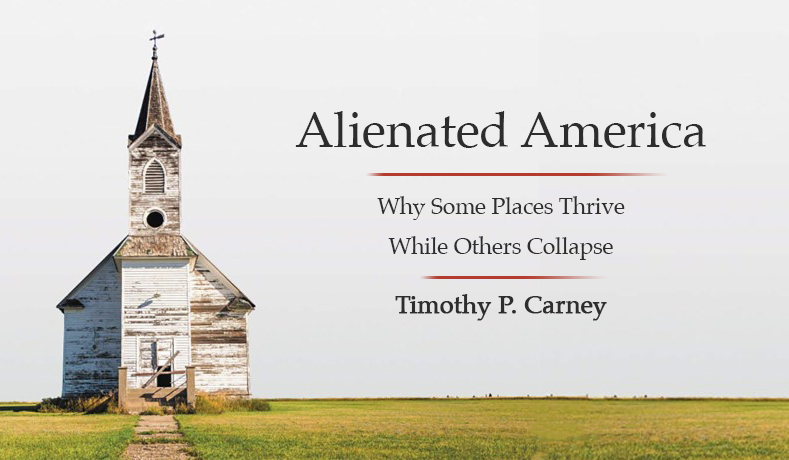
by David Bass | Jun 4, 2019
America is in an economic and cultural crisis, as millions lack the tools that make a fulfilling life: A great education, stable job, and healthy relationships. The chief question, of course, is how to best connect our neighbors with opportunities that lead to a flourishing life.
 Tim Carney—best-selling author, Washington Examiner commentary editor, and a visiting fellow at the American Enterprise Institute—has some excellent answers in his latest book, Alienated America: Why Some Places Thrive While Others Collapse. Tim will be highlighting his findings at this years Breakthrough event in Atlanta, GA.
Tim Carney—best-selling author, Washington Examiner commentary editor, and a visiting fellow at the American Enterprise Institute—has some excellent answers in his latest book, Alienated America: Why Some Places Thrive While Others Collapse. Tim will be highlighting his findings at this years Breakthrough event in Atlanta, GA.
Hot off the press in February, Alienated America examines the dissolution of our nation’s most cherished institutions—nuclear families, places of worship, and civic organizations. In this his third book, Carney chronicles how life is getting worse for people in some parts of the country because folks are facing their problems alone.
And after visiting all corners of America and digging deep into the data, Carney concludes what we here at the Georgia Center for Opportunity (GCO) have been saying for years—failing social connections are driving a great divide in America that can’t be fixed solely with job-training programs or more entitlement spending.
Specifically, Carney makes the case that just three groups represent most of America: the elites, the religious conservatives, and the alienated. And while community and civil society has been eroding across all groups across the nation in recent years, it has not done so equally for each group.
In alignment with GCO’s view, Carney argues that working class people in America are currently suffering more than other groups because they no longer have the institutions to connect them to others—and provide an all-important sense of purpose. It’s this profound lack of belonging—and an inability to see this disconnect—that drives a sense of alienation that not only divides us as a nation, but tragically leads to despair and an erosion of individual self-worth and belief in opportunity.
While the problems before us as a nation often seem daunting, the good news is that both GCO and Tim Carney’s Alienated America present a framework for positive community-focused solutions that overcome deeply entrenched obstacles to opportunity and unleash prosperity at the individual, family, and community levels.
We’re thrilled that Tim Carney will be joining us for Breakthrough 2019 on September 11 in Atlanta. The event brings together some of America’s most innovative researchers, policy experts, and community-based practitioners to lead timely discussions on solutions that unlock human potential—and enable individuals, families, and communities to flourish in Georgia and around the country. Stay tuned over the course of the summer as we announce additional event keynote and discussion panel speakers.

by David Bass | Apr 17, 2019
The economy is booming: Employment is at record-breaking levels, and income and wages are finally rising again. Yet something is missing. Despite all the positive economic news, a significant percent of Georgians (and Americans broadly) have been left behind.
This group of the economically lost and destitute is the subject of a new book called The Once and Future Worker: A Vision for the Renewal of Work in America, written by Oren Cass, a think tanker and former advisor to Mitt Romney. Cass includes a number of viable solutions to America’s workforce woes in his book.
We know the unfortunate numbers: Even though gross domestic product tripled between 1975 and 2015, median wages haven’t budged. During that same time, government spending on the social safety net quadrupled. Even though our economy as a whole is more productive, many Americans haven’t seen a real rise in wages, while many others have fallen into the social-safety-net system.
This has created a type of society where many people have access to iPhones and other electronic devices once considered luxuries, but fewer and fewer have access to fruitful work, a good education, and a healthy family life. As Cass puts it, during the past few decades, “Cheap goods and plentiful transfer payments ensured that nearly all Americans could afford cable television and air conditioning, but not that they could build fulfilling lives around productive work, strong families, and healthy communities.”
Cass makes a number of recommendations to ameliorate the problem, several of which dovetail with policy prescriptions from the Georgia Center for Opportunity (GCO).
One of them is to emphasize alternative pathways to work aside from the traditional college route. The fact of the matter is that attempting universal college completion for all is an unrealistic goal—even though Millennials are the most college-educated generation in history, only 40 percent of them have college degrees. Looking across all generations now alive, the vast majority of Georgians lack a four-year (or higher) college degree. Doesn’t it make sense that we should tailor more training solutions to this majority?
For a solution, Cass suggests the reintroduction of “tracking” into our educational lexicon, where one pathway leads toward college enrollment and another “toward occupational training that leaves a twenty-year-old with serious work experience, a marketable skill, and $30,000 in a savings account.” That is a far more favorable outcome than the reality too often true for Millennials today: burdensome student loan debt with a college credential that increasingly lacks labor-market value. GCO invests in these types of pathways through our apprenticeships emphasis.

by Erik Randolph | Mar 18, 2019
By Erik Randolph, Contributing Scholar
Expanding Medicaid to reduce the number of Georgians without health insurance is an idea continually being promoted. Here are three good reasons why it would be bad for Georgia.
Reason Number One: Expanding Medicaid without fixing the individual markets would trap people in the welfare system.
Nearly 60 percent of Georgia’s uninsured would be unaffected by Medicaid expansion because their family incomes are above the threshold established by the Affordable Care Act (ACA).
The greater proportion of the uninsured has incomes between 139 percent and 400 percent of the Federal Poverty Level. This is precisely the income range that the ACA health insurance exchanges are supposed to serve. Even with the premium tax credit and other subsides, affordability for average-income families was not achieved.
Affordability is extremely important. A study by the Institute of Medicine of the National Academies listed affordability first among reasons why people without health insurance don’t purchase some.
Consider the price increases on the ACA exchanges since their creation. Average prices in Georgia increased by roughly 70 percent since 2014, and in some Georgia counties, they have more than doubled. For 2019, a quarter of Georgia counties has only one insurance company offering policies, and half of the counties has only two insurers.
Most of the uninsured—more than 728,000—are employed. Now imagine you are a single person earning the equivalent of $8.30 per hour working full-time without health benefits. You would earn too much to qualify for Medicaid under an expansion. However, if you could reduce your income by less than five cents an hour, you would qualify for Medicaid.
What would you do if you were in this situation? Would you find a way to cut back just a little on earnings so you can get Medicaid? If you are like most persons, you would indeed.
Let’s reverse the situation. Suppose you earn $8.25 and have Medicaid under an expansion. You know that health insurance is unaffordable on the individual markets. Would you accept a pay raise of just five cents an hour knowing that you would lose Medicaid? Again, if you are like most people, you would find a way—such as working less hours or refusing a pay raise—so that your income would not exceed the threshold.
This scenario highlights the problem of transitioning off public assistance and onto the private system. The financial incentives are stacked against you, trapping you in the welfare system and its associated challenges of a low-income lifestyle.
Reason Number Two: Expansion is really, really expensive.
States that expanded Medicaid were initially enticed by the Federal government that promised to pay 100 percent of the expansion enrollment cost for calendar years 2014, 2015, and 2016. Since then, the federal reimbursement rate has been falling. It was 94 percent in 2018, is 93 percent for 2019, and will be 90 percent in 2020.
Because states must pay part of the bill, it is not surprising to learn that expansion states are doling out even more in state dollars to fund Medicaid than non-expansion states. Based on data from the National Association of State Budget Officers, the expansion states spent 95.2 percent more of their own state funds on Medicaid in 2018 than they did in 2010. As a matter of comparison, non-expansion states spent 81.5 percent more.
To put this in perspective, Georgia would have needed $562 million more in state revenue for its Medicaid program in 2018 had it expanded Medicaid along with the expansion states. This assumes that the cost of Medicaid would have grown consistent with the average experience of the expansion states. The actual cost could be less, or, more likely, it could be more considering Georgia’s population growth and poverty levels.
From a fiscal perspective, not expanding Medicaid saved Governor Deal and the General Assembly from having to increase taxes to raise $562 million in revenue in 2018, or alternatively, from the tough budgetary task of cutting more than half a billion dollars from other state programs, like education, to make room for Medicaid expansion.
When it comes to cost, we should not ignore also the impact on the federal government. According to the Peterson Foundation, health care is a key driver of the federal budget crisis and the national debt. Congress has been making promises it cannot afford, and Medicaid spending is among them.
In economics, there is no free lunch. Someday the rooster will come home to roost. We will pay for the cost one way or another, whether through inflation, cuts in needed services, eventual increases in federal taxes, or distortions in the economy.
Reason Number Three: Medicaid has the worst health care outcomes.
In his comprehensive report Transcending ObamaCare, Dr. Avik Roy correctly observes Medicaid has bad health care outcomes, the worst of any public or private health insurance coverage in America. In fact, and surprisingly, studies have showed those on Medicaid fare no better than those with no insurance coverage at all.
For example, a study published in the New England Journal of Medicineastoundingly showed persons on Medicaid for two years in Oregon did not fare better in measured physical health outcomes than comparable groups who were uninsured. A Columbia-Cornell study on patients with clogged blood vessels or clogged carotid arteries came to the same conclusion.
Considering the notorious bad health outcomes for Medicaid patients, it makes little sense expanding the program without at least reforming it. Or better yet, it should be replaced.
Our Hopes Reside with Governor Kemp and the General Assembly
Governor Kemp is doing the right thing in pursuing federal waivers to redesign the health insurance system and Medicaid. The waivers would give Georgia tremendous flexibility to do it right and even allow Georgia to capture dedicated federal revenue sources to underwrite the cost.
What Georgia needs is a market-based consumer-directed health insurance system with risk equalization coupled with real reform of medical assistance programs. Medicaid needs to be fundamentally changed and consolidated with other programs so poor people can access the same health insurance as everyone else, and so that no one gets trapped in the welfare system.
If done correctly, the redesign will solve the problem of pre-existing conditions, make insurance more affordable, achieve universal coverage, and not undermine the quality of care to which Americans have grown accustomed. Everyone will benefit, poor and rich alike.
* A contributing scholar to the Georgia Center for Opportunity, Erik Randolph researches and writes on welfare reform. Further research on this topic is available on the Center’s website: https://foropportunity.org/employment/welfare-reform.
Sources:
Committee on the Consequences of Uninsurance, Institute of Medicine of the National Academies,Insuring America’s Health: Principles and Recommendations,National Academies Press, 2004. https://www.nationalacademies.org/hmd/Reports/2004/Insuring-Americas-Health-Principles-and-Recommendations.aspx.
Reforming America’s Healthcare System Through Choice and Competition, U.S. Departments of Health and Human Services, Treasury, and Labor, Report to the U.S. President in response to Executive Order 13813, 2018, p. 4: https://www.hhs.gov/sites/default/files/Reforming-Americas-Healthcare-System-Through-Choice-and-Competition.pdf.
Reforming America’s Healthcare System Through Choice and Competition, U.S. Departments of Health and Human Services, Treasury, and Labor, Report to the U.S. President in response to Executive Order 13813, 2018, p. 72: https://www.hhs.gov/sites/default/files/Reforming-Americas-Healthcare-System-Through-Choice-and-Competition.pdf.
Calculations by author using State Expenditure Reports of the National Association of Budget Officers: https://www.nasbo.org.
Peter G. Person Foundation, Key Drivers of the Debt, https://www.pgpf.org/the-fiscal-and-economic-challenge/drivers, accessed February 26, 2019.
Avik S. A. Roy, Transcending ObamaCare: A Patient-Centered plan for Near-Universal Coverage and Permanent Fiscal Solvency, Second Edition, The Foundation for Research on Equal Opportunity, 2016, pages 43 – 45: https://www.manhattan-institute.org/html/transcending-obamacare-patient-centered-plan-near-universal-coverage-and-permanent-fiscal
Baicker K et al., The Oregon experiment—effects of Medicaid on clinical outcomes. New England Journal of Medicine. 2013 May 2; 368(18): 1713–22. https://www.nejm.org/doi/full/10.1056/NEJMsa1212321
Giacovelli JK et al., Insurance status predicts access to care and outcomes of vascular disease.
Journal of Vascular Surgery. 2008 Oct; 48(4): 905–11. https://www.ncbi.nlm.nih.gov/pmc/articles/PMC2582051/

by Georgia Center for Opportunity | Oct 15, 2018
The mandate from Georgia voters is clear—by an overwhelming margin, they want lawmakers in the General Assembly to pass legislation expanding school choice in 2019. That’s the finding of a new poll released by the Georgia Center for Opportunity (GCO).
The survey found that nearly seven-in-ten (67 percent) voters say it’s important for the state legislature to enact policies that expand school choice in the next legislative session, and that support extends across party, racial, and geographic lines. Of all school choice measures available in Georgia, the Tax Credit Scholarship Program garnered the most support.
Underscoring the bipartisan nature of school choice, the survey found strong support for school choice regardless of political affiliation—75 percent of Republicans, 65 percent of Independents, and 62 percent of Democrats. Support is strong across racial and geographic lines as well: 70 percent of African-American voters and 66 percent of white voters support school choice, while voters in Augusta (76 percent), Atlanta (68 percent), and Savannah (65 percent) are also supportive.
These new survey results come on the heels of the General Assembly’s move this year to expand the Tax Credit Scholarship Program to serve tens of thousands of additional students in need of options. In 2019, lawmakers could take up legislation to make Georgia the seventh state to enact Education Savings Accounts, an innovative way for parents to pay for the education their children need.
With the 2019 session of the General Assembly a few months away, elected officials would be wise to pay attention to the voices of more than two-thirds of Georgia’s likely voters—and voice their support for school choice, too!


 Tim Carney—best-selling author, Washington Examiner commentary editor, and a visiting fellow at the American Enterprise Institute—has some excellent answers in his latest book, Alienated America: Why Some Places Thrive While Others Collapse. Tim will be highlighting his findings at this years
Tim Carney—best-selling author, Washington Examiner commentary editor, and a visiting fellow at the American Enterprise Institute—has some excellent answers in his latest book, Alienated America: Why Some Places Thrive While Others Collapse. Tim will be highlighting his findings at this years 


